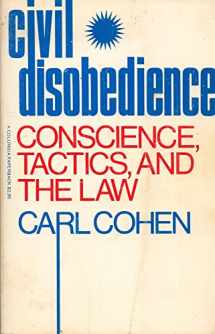
COHEN: CIVIL DISOBEDIENCE (PAPER)
ISBN-13:
9780231086462
ISBN-10:
0231086466
Author:
C COHEN
Publication date:
1990
Publisher:
University Presses of California, Columbia and Princeton
Format:
Paperback
222 pages
Category:
Philosophy
,
Social Sciences
FREE US shipping
on ALL non-marketplace orders
Marketplace
from $5.00
USD
Marketplace offers
Seller
Condition
Note
Seller
Condition
Used - Good
Book details
ISBN-13:
9780231086462
ISBN-10:
0231086466
Author:
C COHEN
Publication date:
1990
Publisher:
University Presses of California, Columbia and Princeton
Format:
Paperback
222 pages
Category:
Philosophy
,
Social Sciences
Summary
COHEN: CIVIL DISOBEDIENCE (PAPER) (ISBN-13: 9780231086462 and ISBN-10: 0231086466), written by authors
C COHEN, was published by University Presses of California, Columbia and Princeton in 1990.
With an overall rating of 3.5 stars, it's a notable title among other
Philosophy
(Social Sciences) books. You can easily purchase or rent COHEN: CIVIL DISOBEDIENCE (PAPER) (Paperback) from BooksRun,
along with many other new and used
Philosophy
books
and textbooks.
And, if you're looking to sell your copy, our current buyback offer is $0.3.
Description
Civil disobedience is conduct that obliges us to think about our obligation to obey the law -- about the ground of that obligation, and the force of it. This book is a philosophical exploration of all aspects of civil disobedience, and an inquiry into the circumstances in which it is, or is not, morally justifiable. The first several chapters present a preliminary conceptual analysis: what civil disobedience is, and is not, and its kinds -- moral and political, direct and indirect. The book is rich with detailed accounts of actual cases of civil disobedience -- from recent history and also from classical history -- some with lengthy citations from the documents in which they are reported. The fourth chapter concerns the punishment of civil disobedience; whether, and with what degree of severity, it is rightly punished. The fifth chapter addresses the most controversial aspect of civil disobedience: how it might be justified. It is plainly a mistake to suppose that all civil disobedience is justified, for the fact that a protest is conscientious does not make it right. Neither is it correct to say that civil disobedience is never justified, for the laws of the state may be cruel and obedience to them may be morally intolerable. The justification, or attempted justification of civil disobedience may involve a resort to some higher law, or may be tactical or utilitarian; the various forms of justification, as applied to the different kinds of deliberate disobedience, are analyzed and appraised. The sixth chapter sets forth seven philosophical arguments against civil disobedience, and examines the replies that may be given to each of them: 1) That civil disobedience implies contempt for the law; 2) That civil disobedience supposes the primacy of selfish interests; 3) That civil disobedients take the law into their own hands; 4) That civil disobedience undermines respect for the law; 5) That civil disobedience is self-defeating; 6) That disobedience cannot be justified when lawful channels remain open. 7) That civil disobedience subverts the democratic process. The question throughout is this: under what circumstances might one or another of these arguments succeed? Examining the counter-arguments leads to the conclusion that in fact those critical arguments do not succeed for the most part. The final chapters of the book explore the complicated relations between civil disobedience and the freedom of speech, and also the relations between civil disobedience and the Nuremberg Judgments. The book is not designed as a defense of those who knowingly break the law. Neither is it an attack upon those who conscientiously act in non-violent ways that are provocative, dangerous and at times self-sacrificial. Civil disobedience is an act of protest, deliberately unlawful, conscientiously and publicly performed. Some such acts are morally justifiable, and some are not. But every thoughtful instance of civil disobedience obliges us to confront some moral issue we might otherwise overlook or evade. This study of civil disobedience is an exploration of the moral principles that rightly govern the relations between citizens and their community.


We would LOVE it if you could help us and other readers by reviewing the book
Book review

Congratulations! We have received your book review.
{user}
{createdAt}
by {truncated_author}


